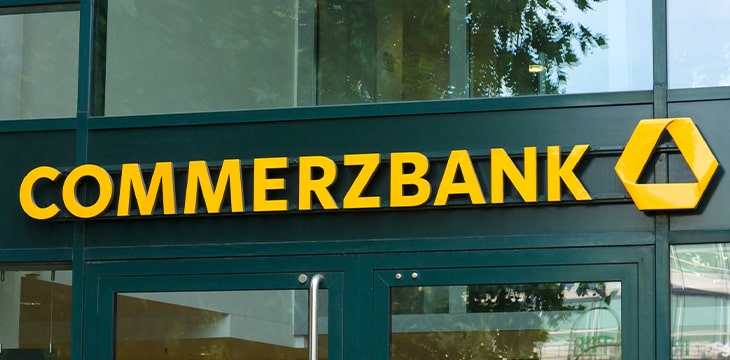|
Getting your Trinity Audio player ready...
|
Commerzbank (CBK) has become the first major German bank to make moves to enter the digital currency market. CBK has disclosed that it applied for a virtual assets license with Germany’s financial supervisory authority BaFin during the first quarter of 2022.
The bank aims to serve as a digital currency exchange by offering custody and trading services for its clients if the license is approved. Commerzbank has over 18 million customers and around 70,000 institutional clients.
Speaking in an interview with local media outlet Börsen-Zeitung, Bernd Reh, a senior spokesman for the bank, said the application is part of the banking giant’s ambition to pursue its digital assets strategy.
“In addition, we are pursuing our own digital asset strategy and are also planning our own offerings for our customers in the coming years. We have applied for a license from the Bafin for the safekeeping of crypto assets,” he said.
He also revealed that Commerzbank’s partnership with Deutsche Börse and Fin-Tech 330x last year was similarly in pursuit of embracing digital currencies. The bank also has a storied history with blockchain technology, going back to 2018 when it carried out one of the first transactions on Deutsche Boerse’s DLT Security Lending Platform.
The banking behemoth is, however, not the first firm to apply for the license with BaFin. Since Germany passed legislation to allow financial service providers to apply for licenses to provide digital currency services in 2020, it has received over 25 applications. However, BaFin has approved only four of the applications, with the first being Coinbase (NASDAQ: COIN) Germany’s filing.
Germany acting friendly with virtual assets
At the time the legislation was passed, Germany’s central bank stated that it did not consider digital currencies to be a threat despite their growing popularity. The conviction the government has in the potential of digital assets continues to propel its policies to date.
This year, Germany’s incoming government has stated that it is fully committed to digitalizing Europe’s largest economy. It aims to greatly improve digital currency regulations for the industry to create a level playing field for market participants across Europe.
The previous and ongoing efforts of the German government have culminated in the country emerging as the most digital asset-friendly country in 2022, as ranked by Coincub. A recent study also found that up to $100 billion to $657 billion could flow into the digital currency market within the next three years.
Watch: CoinGeek New York panel, Bitcoin & Blockchain – Can Real Value Come from Real Utility?
https://www.youtube.com/watch?v=IBAJr8vP5Bw
Recommended for you
British lawmakers of the parliamentary national security committee have called for a temporary ban on political parties receiving donations in

 02-27-2026
02-27-2026 




